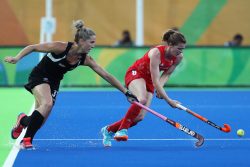VOTE NOW: Voting is open for the rest of this month for SJA members to back their Sportsman, Team and Sportswoman of 2016. Hockey writer SARAH JUGGINS has an easy pick for her Team of the Year
It has been a turbulent four years for the Great Britain women’s hockey team since winning the bronze medal at London 2012.
Playing as England, they crashed at the 2014 World Cup, finishing 11th of 12 after arriving in The Hague as one of the favourites. They sealed their place at Rio 2016 with victory at the 2015 Hockey World League semi-finals in Valencia. Playing as England, they won their first gold medal at the European championships in August 2015, with an unexpected victory over the world No1 team, the Netherlands. But then they finished in an underwhelming fifth of six in front of an expectant home crowd at the Champions Trophy in London just weeks before setting out for Brazil.
So observers could have been forgiven for doubting the team’s ability to bring home a medal, never mind the gold. It was a doubt that persisted even as Great Britain sailed through the group stage, beating all opposition along the way – including Argentina and Australia, ranked No2 and No3 in the world respectively.

There was a small wobble in the quarter finals against Spain, but the team, led by Kate Richardson-Walsh, rallied to win 3-1 and set up an encounter with New Zealand in the semi-finals.
It was at this point that the wider British public – not simply the hockey fraternity – began to take note of what was happening at the Deodoro Stadium. With the likes of Andy Murray, Gary Linker and radio presenter Colin Murray all declaring their support and admiration for the 16 hockey players.
The public tuned in and, in the next match, were treated to a display of hockey that was nothing short of brutally brilliant.
New Zealand are a side known for their physicality and, with an Olympic final at stake, no one was taking prisoners. Crista Cullen sustained a blow to the jaw that saw her sidelined for a while; Georgie Twigg left the field with a facial injury; Helen Richardson-Walsh was felled on route to goal. But Great Britain gave as good as they got, and when the final whistle went, it was the team in red who emerged bruised, battered and 3-0 winners.
“I’m over the moon,” Helen Richardson-Walsh said. “What an outstanding game that was and now we’re going to the final. We’ve beaten a very, very good side pretty convincingly and we’ve got one more game. That’s seven from seven. We want eight from eight.”
“That’s seven from seven. we want eight from eight”
And so to the final. A re-match of the EuroHockey championships, which England had won on penalty shuffles after withstanding long periods of Dutch domination.
It was a case of history repeating itself.
Great Britain had a game plan and it worked. The hours spent practising under intense pressure, the mental and physical fatigue that coach Danny Kerry insisted his players were subject to, the constant striving for higher levels of performance and better decision-making under pressure – they all paid off.
Britain took the lead, despite the pressure, through Lily Owsley. The Dutch scored twice to take a 2-1 lead which was cut just seconds later when Cullen equalised. The Netherlands glided into the lead on the 37th minute. Nicola White sent the game to shoot-out with eight minutes on the clock.
Then it was time for Maddie Hinch to step up. The Great Britain goalkeeper’s “little black book” is now the stuff of legend. In it, Hinch keeps details of all her potential rivals in a penalty shuffle. Through her research, she knows how players are likely to react in pressure situations and she plays them accordingly.
The audience was incredulous as Hinch raced out to put Wilhelmina Bos off her strike. She out-thought Ellen Hoog and danced on the spot to distract Leurien Leurink. And as Margot van Geffin shot wide of the post and Hollie Webb scored for Great Britain, history was made at the Deodoro Stadium.
It is a story that works on so many levels. It is the classic tale of the underdog succeeding; it is the story of a group of women who have lifted themselves to new levels of excellence; it is a story of rising from the ashes, but most of all it was a night in August that gave the 11 million people who tuned in a reason to cheer – that has to be worth voting for.
- The SJA’s British Sports Awards, sponsored by The National Lottery, take place at The Pavilion by the Tower of London on Thursday Dec 15